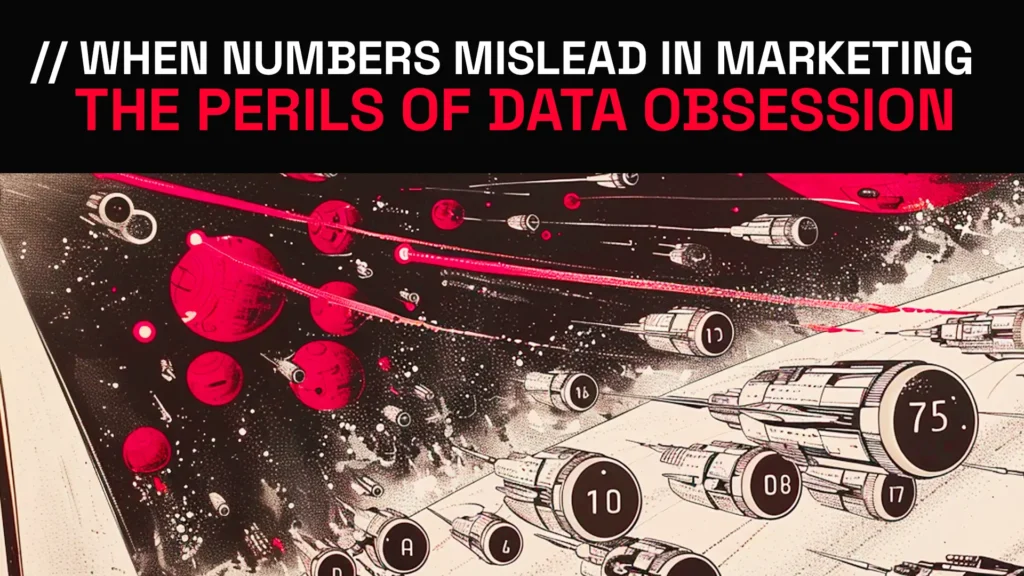
WHEN NUMBERS MISLEAD IN MARKETING: THE PERILS OF DATA OBSESSION
In the era of big data, marketers are increasingly relying on quantitative information to guide their decision-making. While data-driven insights are undeniably valuable, an unhealthy obsession with numbers can lead to myopic strategies and missed opportunities.
This article delves into the pitfalls of being too data-bound in your marketing efforts, with a focus on the unique challenges faced by small business owners operating in local markets with limited budgets.
THE MCNAMARA FALLACY: LESSONS FROM THE VIETNAM WAR:
The Vietnam War serves as a stark reminder of the dangers of over-reliance on quantitative metrics. U.S. Secretary of Defense Robert McNamara’s fixation on the “body count” as a measure of success exemplifies a phenomenon known as the McNamara Fallacy, which refers to the misguided belief that decisions should be based solely on quantitative observations and disregard all other factors.
This narrow focus on enemy casualties led to a distorted view of the war’s progress, as it failed to account for crucial aspects such as public opinion, political stability, and the morale of U.S. troops. Ultimately, the body count metric proved to be a poor indicator of success, and the United States found itself mired in a costly and unwinnable conflict.
The parallels to marketing are clear: an obsession with data can lead to tunnel vision, causing marketers to overlook critical factors that cannot be easily quantified. For small business owners, this can result in a disconnect from their local customer base and a failure to adapt to changing market conditions.
THE ILLUSION OF CERTAINTY – WHEN DATA DECEIVES:
Data has a seductive quality; it promises certainty in an uncertain world. However, this certainty is often illusory. Data can be incomplete, biased, or misinterpreted, leading to flawed conclusions and poor decisions.
In marketing, an over-reliance on data can create a false sense of security. Marketers may become so focused on metrics such as click-through rates, conversion rates, and social media engagement that they lose sight of the bigger picture. They may fail to consider the context in which the data was collected, the limitations of their measurement tools, or the inherent variability of human behavior.

For small business owners, this can be particularly dangerous. With limited resources and a need to make every marketing dollar count, the consequences of data-driven missteps can be severe. By placing too much faith in numbers, marketers may overlook the importance of building genuine relationships with customers and fostering a deep understanding of their needs and preferences.

BALANCING DATA AND INNOVATION:
Data-driven marketing can also stifle creativity and innovation. When marketers become too focused on optimizing existing strategies based on past performance, they may be hesitant to explore new ideas or take calculated risks.
This is particularly problematic for small businesses, which often rely on creativity and differentiation to stand out in crowded local markets.
By being too data-bound, marketers may miss opportunities to connect with customers in fresh and memorable ways, or to adapt to emerging trends and technologies.
To strike a healthy balance, marketers must learn to use data as a tool for informed decision-making, rather than a strict set of rules. They must be willing to experiment, to trust their instincts, and to incorporate qualitative insights alongside quantitative data. As Albert Einstein famously said, “Not everything that can be counted counts, and not everything that counts can be counted.”
UNDERSTANDING YOUR MARKET BEYOND THE NUMBERS:
For small business owners operating in local markets, a deep understanding of their community is essential. While data can provide valuable insights into customer behavior and preferences, it cannot fully capture the nuances of local culture, relationships, and word-of-mouth dynamics.
An over-reliance on data can lead to a disconnect between a business and its local customer base. Marketers may become so focused on optimizing their campaigns based on aggregate data that they fail to recognize the unique needs and preferences of their specific market.
To succeed in a local context, small business owners must supplement data-driven insights with on-the-ground knowledge and personal connections. They must be willing to engage with their customers directly, to listen to their feedback, and to adapt their strategies based on real-time observations and insights.
NAVIGATING CHANGE IN A DATA-DRIVEN WORLD:
In today’s rapidly evolving business landscape, adaptability is essential. Markets can shift, customer preferences can change, and new competitors can emerge at a moment’s notice.
An over-reliance on historical data can hinder a marketer’s ability to respond to these changes effectively.
Small business owners, in particular, must be nimble and responsive to survive and thrive in the face of change. They cannot afford to be tied down by rigid, data-driven strategies that may quickly become obsolete.

To navigate this uncertainty, marketers must learn to use data as a starting point rather than an endpoint. They must be willing to continuously test, refine, and adapt their strategies based on real-time feedback and market observations. They must also cultivate a mindset of continuous learning, seeking out new insights and perspectives to inform their decision-making.
CONCLUSION:
While data is an valuable resource, an unhealthy obsession with numbers can lead to poor decisions, missed opportunities, and a disconnect from customers. By balancing data-driven insights with creativity, intuition, and a deep understanding of their local market, small business owners can develop more effective, adaptable, and customer-centric marketing strategies.
Remember, data should be a tool in your marketing arsenal, not a straitjacket. By embracing the power of data while also recognizing its limitations, you can navigate the complexities of modern marketing with confidence and agility.


